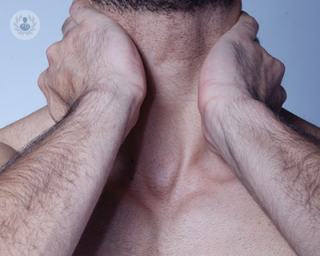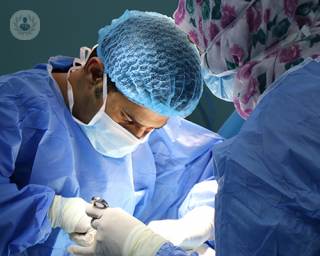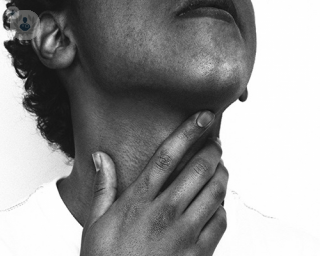Pharyngeal pouch
Professor Martin Anthony Birchall - Otolaryngology / ENT
Created on: 02-28-2017
Edited by: Karolyn Judge
What is a pharyngeal pouch?
A pharyngeal pouch (also called Zenker's diverticulum) is a small bulge or pocket, like a hernia, that occurs in the pharynx. The term ‘pharyngeal’ refers to the pharynx, the part of your throat that connects the mouth, nose and oesophagus – it runs from behind your nose through to the bottom of your neck. Your pharynx is located behind the nose and mouth, and above the larynx and oesophagus.

Prognosis
Pharyngeal pouch is an uncommon condition that usually affects elderly patients (70 years and older) more. If left untreated, the pouch becomes larger and the symptoms worsen. Symptoms could be present for weeks or even years.
What are the symptoms of pharyngeal pouch?
There are several symptoms of a pharyngeal pouch:
- Swallowing difficulties (dysphagia)
- Regurgitation (often of undigested food)
- Bad breath (halitosis)
- Chronic cough
- Hoarse voice
- Weight loss
- Aspiration (accidentally breathing in objects into your airways that you usually wouldn’t e.g. saliva, vomit, food)
- A neck lump
Medical tests to diagnose pharyngeal pouch
To determine if your symptoms are caused by pharyngeal pouch or another condition, your specialist may recommend specific tests such as a diagnostic endoscopy or a barium x-ray test – an x-ray with a white liquid that shows clearly in x-ray scans.
What are the causes of pharyngeal pouch?
The condition is linked to a disturbance in the functioning of your oesophageal sphincter - the muscle that opens and closes to allow food to pass and to stop acid coming back up the stomach. If the oesophageal sphincter doesn’t fully open, pressure is placed on the pharynx wall. As a result of consistent pressure, the tissue eventually pushes outwards, causing a hernia-like pouch.
Treatments for pharyngeal pouch
If the condition is causing problems, the patient will be referred for treatment. There are two main surgical procedures for treating pharyngeal pouch.
Dohlman’s procedure: This surgery involves placing an endoscope (a long, thin, flexible tube with a camera and light) down the mouth to reach the pouch. The surgeon will staple the pouch closed with a stapling gun and the sphincter muscle will be cut to reduce the likelihood that another pouch develops.
Cricothyromyotomy: This involves making an incision into the neck (open surgery). The surgeon will continue the cut until they reach the pouch, which is then removed or pushed back into the oesophagus. Regarding the sphincter, it will also be removed or pushed into the oesophagus but then cut the same way as in the Dohlman’s procedure.
Which type of specialist treats pharyngeal pouch?
An otolaryngologist (ENT surgeon) is the specialist who can diagnose and treat pharyngeal pouch.







